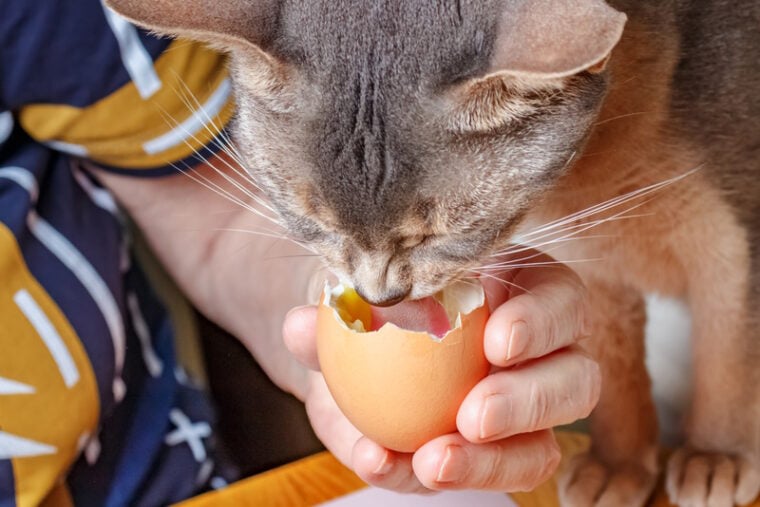
As a cat owner, providing your feline friend with a well-balanced diet that meets their nutritional needs is important. While commercial cat food is an easy and convenient option, many cat owners prefer to supplement their cat’s diet with fresh food.
Eggs are a popular food item that can be added to a cat’s diet. Eggs are a good source of protein, vitamins, and minerals that can help keep your cat healthy. In this article, we’ll cover how to cook eggs for cats, including recipes and what you should know before feeding your cat eggs.
Before You Start
Before you start cooking eggs for your cat, there are a few things you should keep in mind:
Now let’s get into the actual recipes. If you’re not sure how long to cook eggs for cats, don’t worry. We included that in the recipes below.
Disclaimer: These recipes have been approved by a veterinarian because they include only cat-friendly ingredients, however, some of these recipes are not complete and balanced diets to feed your cat on a daily basis. These recipes are a great add-on to your cat’s diet. They are only meant to be fed on occasion and not as a regular staple diet. Please consult your veterinarian to help you decide what is the best diet for your cat.
Recipes for Cooked Eggs for Cats
There are several ways you can cook eggs for your cat. Here are three simple recipes:
1. Scrambled Eggs

Ingredients:
2. Boiled Eggs

Ingredients:
3. Baked Eggs

Ingredients:
Eggs are an excellent source of protein and other nutrients, making them a great addition to your cat’s diet. With these recipes in hand, you can whip up something special for your furry friend with ease.
Serving Eggs to Your Cat
Once you’ve cooked the eggs, it’s important to serve them to your cat in a safe and appropriate manner. Here are a few tips:
Eggs can be a healthy addition to your cat’s diet if served properly. Always cook the eggs before serving, don’t add any seasoning or spices, and be mindful of your cat’s overall diet. With a little bit of preparation and care, your cat can enjoy the nutritional benefits of eggs as a tasty treat or supplement to their regular diet.
Why Should I Feed My Cat Eggs?
You may be wondering why on earth you should feed your cat eggs. Well, the answer is simple: eggs are a great source of nutrition and can help keep your cat healthy.
Not only do they provide protein, fatty acids, vitamins, and minerals—all essential nutrients for cats—but they can also help to improve digestion and, thanks to the yolk’s lecithin content they may reduce hairball formation. Plus, they’re a tasty treat that cats love!
What Are Some Other Foods I Can Make for My Cat?
If you want to make your cat some meals beyond just eggs, there are plenty of other recipes that you can try. For example, you could also mix cooked chicken, a few pieces of broccoli, and an egg for a nutritious meal. If your cat is more of a wet food lover, you can easily make a gravy-like dish by blending it with low-sodium chicken broth.
Just make sure to avoid using any spices, oils, dairy, or other ingredients that could make your cat ill.
Knowing exactly what your feline companion can and cannot eat will help you become the best pet parent. Recognizing that not all cat bowls are equal is also key! The Hepper NomNom Cat Bowl sets itself apart from traditional options by catering to the specific needs of cats. The innovative design offers whisker relief via shallow dishes and promotes digestion with a slight bowl elevation. Find out if the Hepper NomNom is right for your cat by clicking here.
At Pet Keen, we’ve admired Hepper for many years and decided to take a controlling ownership interest so that we could benefit from the outstanding designs of this cool cat company!
Conclusion
Eggs are a fantastic food to include in your cat’s diet. Not only do they provide essential nutrients and help improve digestion, but cats love their taste!
If you’re ever unsure about what the best foods are for your cat, don’t hesitate to check with your vet. Depending on your cat’s health or existing conditions, you may need to adjust their diet accordingly.
In the meantime, eggs are a great place to start—just make sure they’re either pasteurized in-shell or cooked thoroughly before serving them up! With the right recipe and ingredients, your cat will be purring in delight with every meal. Bon appétit!
Featured Image Credit: Vladimir Zhupanenko, Shutterstock









